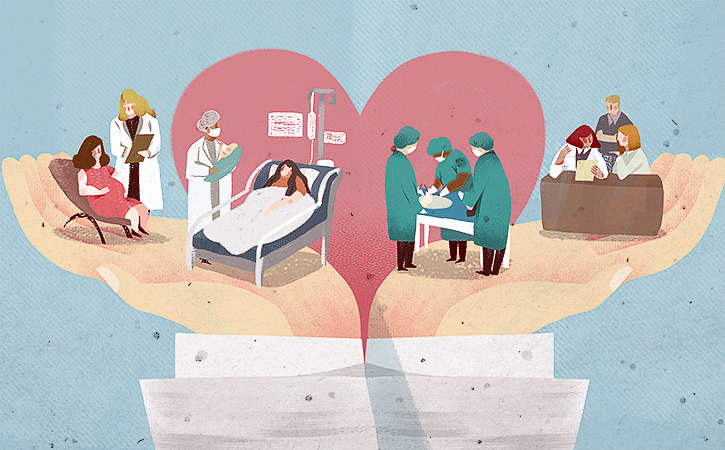Forty-four years ago, the US Supreme Court affirmed a woman's legal right to have an abortion in the Roe v. Wade decision. Today, abortion access is still being fought over in many states — but while you hear all the time from activists on both sides, the doctors who perform these procedures are often left out of the conversation.

[Editor's note: This article is meant to be informational and educational, but it does not speak on behalf of all providers or all patients. Although all quotes are from physicians, this is not meant to replace advice from a medical professional. If you are seeking an abortion or have any questions about abortion, talk to your doctor or a health educator.]
1. Abortions are just one part of the job. These are OB-GYNs, family physicians, maternal-fetal medicine specialists, medical directors, and more.
"The majority of my practice is full-scope OB-GYN care, so I provide abortions but I also work in infertility, obstetrics, gynecological surgery such as hysterectomies, family planning, [I treat] abnormal uterine bleeding, and I also work at a local country jail providing gynecological care for incarcerated women. Some people think I terminate pregnancies but I deliver babies too, and I love that part of my job."
—Dr. Rachna Vanjani, OB-GYN, San Francisco, California, fellow, Physicians for Reproductive Health
"I get to care for women during these monumental times throughout all the stages of their lives. That may mean providing prenatal care, helping a woman through a miscarriage or stillbirth, helping women who choose adoption, providing care during menopause, or safely terminating pregnancies — and for me, it's a great honor."
—Dr. Lisa Perriera, OB-GYN, Philadelphia Women's Center, Pennsylvania, fellow, Physicians for Reproductive Health

2. Abortion providers don't feel like they're on the fringes of the medical community.
"Because of the stigma around the word abortion, there's this idea that an abortionist is some unprofessional on the fringes of the medical community, but that's not true at all — I very much tie my identity to professionalism and the tenets of medical ethics and that's what drew me to this field in the first place."
—Anonymous OB-GYN, New Mexico, fellow, Physicians for Reproductive Health
3. Most pursued training in abortion care because they wanted to help women.
"I perform a simple medical procedure all day and walk out of work knowing I impacted the lives of 15 to 20 women. In most cases, I took away the biggest worry or obstacle in their lives at that moment so they could follow their dreams or finish their education, get a better job, and have the family they want in future. In that sense, I feel like I get to save women's lives every day."
—Dr. Sara Imershein, OB-GYN, clinics in the DC area
4. Patients should expect to be treated with kindness and compassion when they come in for this procedure.
"I remember the first patient I ever had took my hand during the procedure and said thank you for being there and being so kind and it just broke my heart and still makes me tear up that she was so shocked at our kindness and thought maybe she didn't deserve that or shouldn't expect it.
"My patients are the reason why I go to work every day. I know that many of them have experienced so much hostility and judgment and they are very grateful to have a compassionate provider. So if I can do that, if only for a short period of time, it means the so much."
—Anonymous OB-GYN, Oregon
5. They don't see their role as judging you or your decision — they just want to give you safe, professional care.
"My patients should never feel like they need to justify their decision to me — if it helps them to talk through it, I am always happy to listen — because I will never judge their reasoning and all I want is for them to be as healthy and safe as possible, regardless of the circumstances."
—Dr. Raegan McDonald-Mosley, chief medical officer, Planned Parenthood Federation of America, OB-GYN, Maryland
6. Legal abortions are safe and do not affect your ability to get pregnant in the future.
"Abortion is much more common and safe than anybody unfamiliar with the procedure realizes. Medical and surgical abortions do not have any impact on future fertility, and the body goes completely back to normal. It's a simple medical procedure that doctors have been doing for a long time and it's very low-risk."
—Dr. Imershein, Washington, DC
"Abortions are very safe and most are done in a doctor's office exam room. Any patient can go to a hospital, but they really only need to if they are high-risk or they have a medical condition that requires extra care or monitoring."
—Anonymous OB-GYN, Michigan
7. In fact, childbirth is riskier than an early (legal) abortion.
"This is one of the safest medical procedures a woman can have. There’s a higher risk of something going wrong when you continue a pregnancy than there is when you get an abortion, especially if the abortion is done early in the first trimester."
—Anonymous OB-GYN, Oregon
8. The vast majority of abortions occur in the first trimester.
"There's this perception about abortions among the public and in the media that abortions are always done later in a pregnancy, but that's not true — most abortions in the US happen before 21 weeks, and the majority of those happen in the first trimester."
—Anonymous OB-GYN, Oregon
9. The phrase "partial-birth abortion" isn't actually a medical term used to describe abortions.
"There are a lot of misconceptions about second-trimester abortions and when they are performed. Most happen well before 23 or 24 weeks, because [after] that point we're getting into the third trimester and the fetus is reaching viability [the point at which it can survive on its own outside the womb, which varies] and most states prohibit abortions this late anyway.
"But even though second-trimester abortions are done later in the pregnancy, the phrases 'late-term abortion' or 'partial-birth abortion' you hear are not medical terms we use to describe abortion. They often describe a fetus being removed from the womb in the final days of a pregnancy, which is essentially a cesarean section."[Politicians have used this term] to describe a fetus being removed from the womb in the final days of a pregnancy, which is essentially a cesarean section, [not an abortion]."
—Dr. Perriera, Pennsylvania
10. Surgical abortions aren't technically surgeries — they require no incisions or sutures — and they usually last around 10 to 15 minutes.
"Surgical abortions should really be called procedural because there's really no surgery involved — there is no knife involved and no cutting or scraping or sewing incisions back together — all we do is go through a natural orifice in the body and remove the lining of the uterus and everything attached to it, either by using suction or sometimes forceps. And we usually do the procedure in a doctor's office, not in a surgical center or operating room."
—Dr. Imershein, Washington, DC
11. They want people to understand what actually happens during an abortion. (Some readers may find these details graphic.)
"The abortion is usually the fastest part of the whole appointment. If it's early enough in gestation, we can do medical abortion — it's a two-step pill process. First you take mifepristone, then 24 hours later you take misoprostol — these expel the pregnancy from the uterus and you bleed like you do in a miscarriage.
"First-trimester surgical abortions only take about 2 to 7 minutes and second-trimester abortions take around 10 to 15 minutes. We lightly sedate the patient and insert a speculum, then we numb the cervix with a shot of lidocaine before we dilate it a few millimeters using a tapered metal rod. Then we place a small tube that's thinner than a drinking straw through the opening in the cervix, and it's attached to a suction machine so it draws the uterine lining and pregnancy into the tube and out of the body.
"If it's a second-trimester pregnancy, we dilate the cervix a few centimeters so sometimes we might need to put synthetic dilators in the day before to help the cervix soften overnight. We typically give the patient more anesthesia and we usually have to use forceps in addition to suction to remove the fetus from the uterus. I think it's important to explain the procedure very clearly, because demystifying what happens can dispel many of the myths and false information."
—Dr. Deborah Oyer, family physician, medical director of Cedar River Clinics, Seattle, Washington
12. How a patient feels after the procedure varies from person to person.
"After the procedure, some women really grieve the loss of a pregnancy and they'll ask for an ultrasound picture to take home, but many women also feel very relieved and like a huge weight has been lifted off their shoulders. [Those women may also ask for an ultrasound picture to remember the pregnancy and value it, but not feel like they made the wrong decision.] And whatever a woman feels after the procedure, she is allowed to feel that."
—Dr. Perriera, Pennsylvania

13. They don't see their job as convincing anyone to have an abortion; they simply give them the information they need to make a decision.
"There's this huge misconception that I make decisions for other people — but I don’t decide anything for anyone. I provide counseling, and support so that they can make the right decision for themselves. As a medical professional, it’s my legal, ethical, and moral obligation to give a patient all the information they need to make informed, competent decisions."
—Dr. Sarah Wallett, medical director, Planned Parenthood Greater Memphis Region and OB-GYN, Memphis, Tennessee
14. They want to make certain that a patient is 100% sure of their decision and that they made it on their own.
“We don't perform abortions for woman who seem unsure — we never want a patient to feel like someone talked them into it. If I ever sense that a patient isn't comfortable with their decision, I'll stop and make sure they're ready. So yes, that means some women change their minds at the very last minute. I've even stopped a procedure right as I was putting a patient under anesthesia. And if that's the right decision for them, we always respect it."
—Dr. Imershein, Washington, DC
15. They don't all work at Planned Parenthood.
"Abortion care is often synonymous with Planned Parenthood, but that's not the case. Actually, the majority of abortions are done by independent providers at either private or public clinics. And it's not as if it's 'Planned Parenthood versus independent providers' or one is better than the other — they are just different, usually in terms of which services they provide."
—Dr. Oyer, Washington
16. They provide abortions to all different kinds of women, for all different reasons.
"I may perform [multiple] abortions in one day and every single woman will have a different reason why she's there. For example, on a typical Saturday [I've seen] these patients: One woman had her GRE book on her lap and was studying during every free minute of her appointment, and she said she got an abortion so she could go to grad school; one woman really wanted a baby but there was a severe fetal anomaly and the pregnancy wasn't viable; one woman had been trying to get pregnant with her husband for two years, then she was [sexually assaulted] and didn't know if the baby was his and was very traumatized, so she chose to get an abortion. There is no one reason why a woman gets an abortion, but every reason is valid."
—Dr. Vanjani, San Francisco
17. That includes women who identify as "pro-life" or who are very religious.
"I practice in Memphis, where there's a church on practically every corner and my patients are from the Mississippi Delta region. So most of the women I provide abortions to are religious. Sometimes I think those religious patients feel even more stigma and feel more alone than other patients because society teaches us that religious people just don't agree with or have abortions. But that's not true."
—Dr. Wallett, Planned Parenthood, Tennessee
18. Sometimes they care for women dealing with substance abuse who've been using during their pregnancy.
"We have a large population of substance abuse patients who are dependent on illegal drugs [such as heroin] or alcohol, and many are either afraid or know that they've caused harm to the pregnancy because of their drug use. They often feel like they need to terminate the pregnancy so they can get sober, because otherwise they'd keep using and harm the baby even more."
—Anonymous OB-GYN, Michigan
19. Other times that's mothers who — for whatever reason — cannot have another child at this time.
"We see all different kinds of women, but a lot of them are mothers who know how challenging and expensive raising a child can be. They often decide to get an abortion so they can allocate their resources and care and time toward the children they already have."
—Dr. McDonald-Mosley, Planned Parenthood, Maryland
20. And other times patients are ending a desired pregnancy because something went wrong.
"Many of my patients deeply desire to carry their pregnancy to term and to go home with a healthy newborn but complications occur that make the prognosis for the mother and/or the fetus very dire. In those circumstances, some families choose to end the pregnancy, and often to minimize suffering for a baby that will be born very sick with no or minimal chance of survival. For these patients, the decision to end a pregnancy is very difficult and made from a place of love and compassion. The rhetoric on both the pro- and anti-choice sides often overlooks these patients."
—Anonymous maternal-fetal medicine physician, Utah
21. Those cases can be hard on the doctors, too.
"When a woman or a family hears bad news about a desired pregnancy, it shakes them to their core. The information I need to convey is sometimes the worst news they have ever, or will ever, hear. A woman that goes to the doctor and receives terrible news about a pregnancy is not the same woman that comes home."
—Anonymous maternal-fetal medicine physician, Utah
22. You probably know someone who's had an abortion.
"One in three women has had an abortion in America, so statistically, you know someone — she might be your mother or your sister, your aunt, your daughter, your neighbor, your co-worker — there's this societal sense that any women who have had abortion are the 'other' but she is us, she is all of us."
—Anonymous OB-GYN, New Mexico
"Every woman thinks she's the only woman she knows who’s had an abortion, but it's actually very common. We only think it's rare because it's taboo to talk about."
—Dr. Oyer, Washington

23. False information about abortions can cause unnecessary paranoia and delay care.
"By the time we see patients, they might believe that the procedure will impair them for life or it'll cause them to get breast cancer or they'll never be able to have a baby again. It's very difficult for us as doctors because we only get to see these patients for an hour or two, yet we still have to gain their trust in that time, enough to dispel all of the myths and erase the fear that they've caused [patients]."
—Anonymous OB-GYN, Michigan
24. Nobody thinks they're going to need an abortion — just like no one expects an unplanned pregnancy.
"Nobody thinks it'll happen to them, just like nobody expects an unplanned pregnancy. You truly don’t think you'll need an abortion until you need one."
—Dr. Perriera, Pennsylvania
25. In the providers' experience, most women who get abortions have carefully thought about their decision for a long time before their first appointment.
"People think because the legislature mandates a waiting period that women haven't thought carefully about their decision to get an abortion by the time they come into the clinic. But they have thought about it extensively, from the moment their period was late or they saw a positive pregnancy test or the day they called to make an appointment. Most people know pretty immediately if it's the wrong time in their life to be pregnant."
—Dr. Imershein, Washington, DC
26. Talking about abortion can help de-stigmatize it, but not every woman wants to talk about her abortion — and that's okay.
"We want women to feel comfortable enough to talk about their abortions because its real and it happens every day. The silence around abortion can be harmful and increase the stigma, and we need to stop it."
—Dr. Perriera, Pennsylvania
"A lot of people will say women should talk about their abortions to fight the stigma, but that also might be too much to ask for some women — especially if they have to parade their stories in front of men who don't understand at all. Abortion, just like any health issue or medical procedure, is still a private matter and we should respect that. There is no one way to de-stigmatize abortions."
—Anonymous OB-GYN, Michigan
27. Some doctors are open about what they do, some aren't.
"There's a spectrum of being 'out' as an abortion provider. Some of us are very public about it and some people keep it private, but it really depends on the context — their comfort level, where they live, their family's beliefs, the threat of harassment around them.
"I’m very open about my work and what I do, despite the risks. One of my favorite stories is about this time I was at a farmers market and I struck up a conversation with this big, burly bearded man covered in tattoos. He asked me about my job and I told him, then there was a nervous pause. Suddenly, his face just lit up and he told me he used to volunteer as a patient escort at a clinic in rural Pennsylvania, and we ended up having this amazing conversation. You can never expect how people will react, but in my experience it's often positive."
—Dr. McDonald-Mosley, Planned Parenthood, Maryland
28. The threats and harassment can be scary, but it doesn't stop them from doing their jobs.
"People have made postcards with my face and address on them in an attempt to discredit me as a physician or put me in danger. It can get scary, but I really worry more for my partner and my kids. I can’t live in fear every day as a provider."
—Dr. Perriera, Pennsylvania
"There were fliers in the neighborhood saying I was a murderer, so I had to explain to my kids pretty young that if a pregnant woman isn't ready to have a baby, I help her get 'un-pregnant.' But otherwise, it doesn't bother me."
—Dr. Imershein, Washington, DC
29. The protesters outside the clinics don't make women change their minds, they just make them feel more guilt and self-blame.
"The protesting doesn't change anyone's mind, it just makes patients feel terrible and internalize the stigma. I don't think the protesters realize that they are forcing these women to suffer a trauma, and sometimes they'll come into the clinic so upset and they'll think they deserved it. Nobody deserves that. It's so terrible and unkind. I often try to listen and understand the anti-choice rhetoric because I'd love to engage in a productive dialogue, but I don't feel like I'm being met halfway. And when they harass or disrespect my patients, that's just not okay."
—Dr. Perriera, Pennsylvania

30. Abortions are not federally funded. Most women pay out of pocket or use their insurance.
“Either the patient pays for an abortion or their insurance pays for all or part of it. The Hyde Amendment makes it illegal to use federal funds for abortion services except to save a woman’s life. We can offer low-income women grants from national funds, for example through the National Abortion Federation — otherwise, it’s really up to the state and insurance companies. Some states will fund ‘medically necessary abortions’ under Medicaid, but there are usually restrictions. In most cases, the patient pays out of pocket,”
—Anonymous OB-GYN, Michigan
31. Some abortion providers also care for undocumented immigrants and people who cross the border to get health care.
"We get to practice global health domestically in border cities, such as San Diego and El Centro, where our clinics are truly steps away from Mexico. At Planned Parenthood, we don’t ask our patients if they are citizens or not — we just provide care to anyone comes through our door. But if we do take care of undocumented immigrants, they pay for services out of pocket, often in cash. And we'll sometimes have patients come across the border from Mexico just for the day to get an abortion, and go back at night. Regardless of immigration status, we believe women should have access to quality health care."
—Dr. Sierra Washington, medical director and chief medical officer, Planned Parenthood Pacific Southwest, OB-GYN in San Diego, California
32. State restrictions often act as a barrier to getting safe and timely care.
"Most restrictions are rooted in making abortion inaccessible, not science or medical literature. And it's very frustrating because they influence what I do — Tennessee state law requires state-mandated counseling and a 48-hour waiting period, so two in-person visits — but I know these extra steps aren't medically necessary. All they do is make the process seem more scary and confusing, or make it harder for women to get the care they need, when they need it."
—Dr. Wallett, Planned Parenthood, Tennessee
"The state you practice in can definitely dictate the kind of care you provide to women. I'm very lucky to practice in Maryland where there aren't many restrictions or non-evidence-based barriers to care — there's no wait period, we can waive parental consent, and it's a safe and calm environment. I don't ever really have to turn women away who desperately want an abortion."
—Dr. McDonald-Mosley, Planned Parenthood, Maryland
33. Doctors can't diagnose many fetal anomalies until later in the pregnancy, which is why many doctors oppose 20-week bans.
"When biology and nature do not work as planned, it is imperative that patients have options available to them, including pregnancy termination. The ways in which a normal pregnancy can go awry are so numerous and varied that even my colleagues and I can’t predict them all, and we are experts! If we can’t predict every complication that can arise, politicians and lawmakers certainly cannot do so."
—Anonymous maternal-fetal medicine physician, Utah
34. It can be stressful to feel like their job is in constant threat or that the way they care for their patients might change because of new legislation.
"It's funny because they always say 'keep politics out of the exam room,' but [what's not funny is that] politics are [then] constantly threatening how I do my job and practice medicine. It's so stressful to think that on a monthly or yearly basis, the way I provide care is threatened."
—Dr. Vanjani, San Francisco
"It always feels like I'm fighting to defend a procedure that is shown over and over again in the medical literature to be safe and effective and positive for women and families. I'm in a constant battle to help women and it can get exhausting sometimes, but the good days outweigh the bad ones."
—Dr. Wallett, Planned Parenthood, Tennessee

35. They think the concept that people will use abortions as birth control is pretty ridiculous.
"Anti-choice individuals will say that 'people will get abortions over and over again and [better access will allow] them to be irresponsible.' Never once in my career of being an abortion provider have I ever felt that to be true. I think it's ridiculous and it's just a way to stigmatize abortion. Even if abortion is made more accessible, it's still a difficult thing to go through and no one would want to do it all the time."
—Dr. Vanjani, San Francisco
36. Many patients choose to go on some form of birth control after their abortion; some even get an IUD during their procedure.
"After a patient gets an abortion, [and she was terminating an undesired pregnancy], it's a great time to talk about contraception because she already knows she doesn't want to be pregnant at that time. I'd say [the overwhelming majority] of the women I provide abortions to end up choosing some form of contraception afterward."
—Dr. Vanjani, San Francisco
"Many of my patients decide they want to prevent pregnancy for several years so they choose to get either a hormonal or copper IUD, and we'll implant this right after we perform the abortion, while the cervix is still dilated and we have the speculum inside you. We just do it all in one procedure."
—Dr. Oyer, Washington
37. It's not as simple as being either pro–abortion rights or anti–abortion rights; there's a huge gray area in the middle.
"Abortion has become so polarized in US, and people think that there’s only pro-abortion and anti-abortion sides, so the gray area of abortion gets completely lost. It’s honestly a very complex thing, and the reality is that nobody wants to have an abortion — nobody wakes up and thinks, Hey I think I'd really like to get an abortion today.
"So it's very frustrating when people oversimplify it and think women and doctors are either good or horrible people, and it's either right or wrong. The reasons why someone chooses to get an abortion are so complex. As a provider, I'm just here to respect women and help them regardless of the circumstances or how I feel."
—Dr. Washington, Planned Parenthood, San Diego
38. In their eyes, the best way to decrease the abortion rate is to increase access to effective, reliable contraception.
"If more women are able to access highly effective forms of birth control, there will be fewer unplanned pregnancies and fewer abortions — it's pretty simple. Unfortunately, many states have restrictions not just on abortion but all reproductive health care, which isn't good for health outcomes."
—Anonymous OB-GYN, Oregon
39. Being an abortion provider can be incredibly rewarding, especially in the long-term.
"Abortion providers have some of the lowest rates of physician burnout. Medicine can be very frustrating because we try really hard to fix things that are often out of our own control, and some problems like type I diabetes or heart disease we can never fully 'fix,' but in this specific aspect of women’s health care, we can do this simple, safe procedure that has the potential to change a woman’s life — and that’s pretty beautiful."
—Anonymous OB-GYN, New Mexico
40. They are all physicians. But, now, many of them are activists, too.
"Many of us went into the job to take care of women and came out being activists even though some of us are total nerdy introverts and would be happy being quiet. But we see all the setbacks and you feel compelled to stand up and make a difference and defend access to care; and these days I only feel more and more encouraged to speak up."
—Dr. McDonald-Mosley, Planned Parenthood, Maryland
41. Abortion won't stop happening if it becomes illegal.
"No matter how bad the stigma, the protesters, or the barriers, women still come in. There are even women who come in after hearing all these misconceptions who think the procedure is scary or they'll never get pregnant again — and despite all that, they still show up. It just shows how important this procedure is to women and their lives, that they’re willing to take all of that on. The women who really want abortions will get abortions."
—Anonymous OB-GYN, New Mexico
"The more restrictions on abortions, the more likely it is for women to resort to illegal and unsafe practices to terminate a pregnancy — abortion has always existed, even when it was illegal, and it will always exist in the future."
—Dr. Perriera, Pennsylvania
Special thanks to the organizations who connected us with providers: Physicians for Reproductive Health, Planned Parenthood Federation of America, National Advocates for Pregnant Women, and The Women's Centers.

UPDATE
This post has been updated to include small clarifications from sources.

